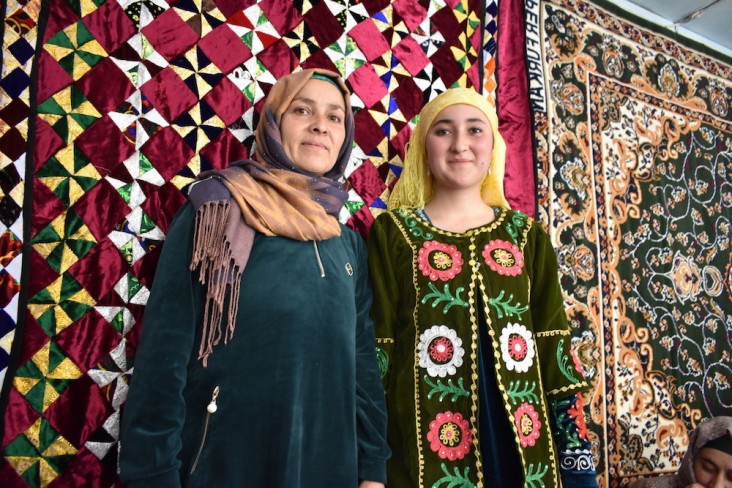Speeches Shim

Sayohat Islomova, 39 years old, lives with her three children in Kapali village of central Tajikistan. Kapali village is a place where women traditionally do not work outside the home and most households depend on men for financial support. However, difficult economic situations have driven some men to search for opportunities outside of Tajikistan, some of which never return home abandoning their families. Women are left to pick up the pieces and find ways to support their families.
Sayohat’s husband left Tajikistan to find work abroad, where he met another woman, married her, and abandoned Sayohat and their three children. Sayohat was left with no choice. “My family’s needs made me reconsider my view of family traditions, and I went to work,” says Sayohat. She now works at the Bakhtinisso craft workshop to support and provide for her three children.
“My friends at the workshop helped me get on my feet,” she reminisces. Sayohat’s oldest son is a student at one of the universities in the capital of Tajikistan, Dushanbe. When her husband left them, she didn’t have the means to support her family. Women at the workshop sent part of their revenue to Sayohat’s son so that he could buy food.
The women of Kapali didn't think they could provide for their families, let alone start a business. Nazira Ismoilova set up the Bakhtinisso craft workshop two years ago to support women like Sayohat. Nazira became the first female entrepreneur from Kapali village.
Nazira is actively involved in many initiatives at both the rural and regional levels. Once she attended a seminar by a public organization, Fidokor, that works with rural communities throughout Tajikistan. They taught vulnerable community members to find solutions to pressing social problems by creating self-help groups, mobilizing resources, and starting businesses. Nazira could not watch the constant suffering of her neighbors and wanted to open a craft workshop to create national embroidery and patchwork, or kurok in Tajik language, to support women.
"Many of us already knew how to make embroidery crafts, but we didn't have the proper sewing equipment and materials. There has always been, and remains, a demand for such products," notes Nazira Ismoilova. Nazira gathered ten women from her community, including those who were abandoned by their migrant laborer husbands, and started Bakhtinisso - which means “happy girl” in Tajik - a craft workshop and a training center for women that was named after Nazira’s daughter.
Nazira received a $5,000 grant through a small grants program for civil society organizations and public initiatives, implemented by the USAID-funded Partnership for Innovations program. (The grant program currently supports five, local community initiatives in the Tojikobod region of Tajikistan where Kapali village is.) Last September, Bakhtinisso purchased seven sewing machines and special embroidery equipment with funding from USAID. The women paid for the rest of the expenses themselves.
Work progressed slowly but surely. At first, they made blankets and other household accessories and exhibited their products at a local craft fair at a regional level in Rash Valley. Then they began selling at a local market and informed others in the community that they were taking orders for events such as weddings and births.
"The attitude of people, and especially men toward us, women who earn their honest work, has radically changed," says Nazira. "Before, many men did not believe we could succeed or simply looked at us with a smirk. Now, however, I can see respect in their eyes. After all, for the sake of her family and children, a woman is capable of the hardest work; the kind of work that sometimes a man does not have the power to do."
First and foremost, women at Bakhtinisso support other women in the community to become self-reliant. For instance, craftswoman Nasiba Ustoyeva, who trained women who did not know how to sew, suddenly got very sick. She had four children and a husband, who went abroad to find work, and she could barely make ends meet. The women from Bakhtinisso donated part of their revenue to buy her medicine and helped care for her two young children at the daycare center while she was recovering. Now Nasiba earns a living from her sewing.
"I dreamt of going to college, but my parents did not want me to continue my studies. Now my only dream is for my daughter Bakhtinisso to finish school and continue her studies at the university,” says Nazira. “Let girls learn and become educated. An educated woman is an educated society. That will help the development of the whole country in the future.”

Comment
Make a general inquiry or suggest an improvement.